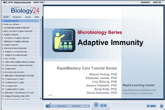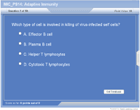| How to Learn in 24 Hours? |
|
| Need Help? |
M-F: 9am-5pm(PST):
Toll-Free: (877) RAPID-10
or 1-877-727-4310
24/7 Online Technical Support:
The Rapid Support Center
vip@rapidlearningcenter.com
Secure Online Order:

|
| Tell-A-Friend: |
Have friends taking science and math courses too? Tell them about our rapid learning system.
|
|
Adaptive Immunity
| Topic Review on "Title": |
Adaptive Immunity:
- Functions: (1) Destroy invading pathogen or toxin, (2) Specific to pathogen, (3) Innate and Adaptive immune collaborate to eliminate the pathogen, (4) Immune memory protects for a long period of time and (5) Distinguishes self from non-self.
- Two types of adaptive immunity: active and passive.
- Active Immunity: resistance by an organism to a pathogen or antigen as a result of antigenic stimulation. The antigen would have evoked an immune response.
- Passive Immunity: is immune protection by exogenously supplied antibodies. Examples of this include transplacental transmission of antibodies from bother to fetus and immune globulin injections.
- Cells involved: Lymphocytes which make B lymphocytes (B cells) and T lymphocytes (T cells). Antigen presenting cells (APC’s) which include macrophages, B cells and Dendritic cells.
Lymphocytes:
- Circulate through blood and lymphatic system. They produce and display receptors for antigen binding. They are further classes into B-cells, T-cells, or T-lymphocytes.
- B-Cells, B-lymphocytes come from the bone marrow and mature there. B-cells have receptors that are membrane bound antibody molecules. They are inactive (naïve) before exposure to an antigen. Once activated they proliferate into memory cells and antibody secreting effector cells or plasma cells.
- T-Cells, T-lymphocytes migrate to a lymphoid organ such as the thymus where they mature. The mature T cell express a novel antigen binding receptor called the T cell receptor (TCR). TCRs only recognize antigens that are associated with cell membrane proteins known as MHC (Major Histocompatibility Complex) molecules. Cytotoxic T-cells defend against infections by viruses and bacteria, diseases, tumors cells and transplanted tissues.
- Antigen Presenting Cells (APC) is a cell that holds a foreign antigen complexed with MHC on it surface. T-cells may recognize the complex with the TCR. Many cells can present antigens to T cells via MHC I molecules but the term is usually limited to cells that prime T cells.
- Dendritic cell is APC and can be found in the skin, mucosa and lymphoid tissues. They are involved in initiation of immune responses by activating lymphocytes and secreting cytokines. They have long membrane processes.
- An effective immune response involves lymphocytes and antigen presenting cells.
- Two types of lymphocytes are B-cells and T-cells.
- Three main antigen presenting cells are: macrophages, B cells, and dendritic cells.
Humoral Responses
- Two classes of adaptive immune responses: Humoral (antibody) and Cell Mediated immune responses.
- Humoral immune responses are carried out by B-lymphocytes. Primary focus on exogenous antigens.
- B-cells are activated to secrete antibodies.
Cell Mediated Immune Response (CMI)
- Cell mediated immune responses are carried out by T-lymphocytes. Primary function endogenous antigens.
- Activated T cells react directly with a presented antigen.
- CMI responses are carried out by TH cells and TC cells.
- A function of T cell would be to kill a host cell that is infected by a virus and is displaying viral antigens.
- T cells produce signal molecules that activate macrophages to destroy the microbes that they have phagocytoses.
Clonal Selection B-Cells
- B-cells that have been antigenically committed mature in the bone marrow.
- Different antibodies are produced against the same antigen via gene rearrangement in the step cell.
- Antigen dependent proliferation and differentiation into plasma and memory cells.
- Clonal selection by antigen antibody binding occurs.
- Clonal selection of an antigen activated B cell leads to a clone of effector B-cells and memory B-cells.
- Plasma cells secrete antibodies to neutralize and eliminate the antigens.
Clonal Selection T-Cells
- Clonal selection is similar to that of B cells.
- T-cell population results in the clone of effector T-cells and memory T-cells.
- Effector T-cells include T helper cells and cytotoxic T lymphocytes.
Processing and Presentation of Antigen
- An antigen must be degraded into small units (peptides) and complexed with MHC I or II molecules in order for a T-cell to recognize it.
- Antigen processing and presentation is the conversion of antigens into MHC associated fragments.
- The route that an antigen enters a cell determines if it will be processes and presented with class I or class II MHC molecules (extracellular or intracellular entry).
- Exogenous antigens are degraded by APCs (macrophages, B-cells, dendritic cells) and complexed with class II MHC and displayed on the cell surfaced.
- Endogenous antigens like tumor or viral proteins which alters “self cells” are degraded in the cytoplasm and displayed with class I MHC molecules on the cell surface.
|
| Rapid Study Kit for "Title": |
| Flash Movie |
Flash Game |
Flash Card |
| Core Concept Tutorial |
Problem Solving Drill |
Review Cheat Sheet |
 |
 |
 |
|
| "Title" Tutorial Summary : |
This module presents the fundamental aspects of Adaptive Immunity and differentiates that from Innate Immunity. Adaptive immunity is the immune response that an organism “learns” after being challenged by antigens and pathogens. The immune system responds differently depending on the nature of the challenge.
There are essentially two types of immune responses, humoral and cell mediated. Humoral responses are targeted to eliminate exogenous antigens while the cell mediated response it focused on the elimination of endogenous antigens. Together these two immune responses complete each other.
|
| Tutorial Features: |
Specific Tutorial Features:
- Immune response requires recognition of antigen and response to antigen.
- Basic adaptive immunity is presented.
- Humoral and cell mediated immune response.
- How antigens and processed and presented.
- The up regulation, clonal selection of lymphocytes.
- Adaptive and innate immunity are compared and contrasted.
Series Features:
- Concept map showing inter-connections of concepts.
- Definition slides introduce terms as they are needed.
- Examples given throughout to illustrate how the concepts apply.
- A concise summary is given at the conclusion of the tutorial.
|
| "Title" Topic List: |
Adaptive Immunity is the resistance acquired during the life time of an organism that is adaptive or acquired.
There are four characteristics of adaptive immunity: antigenic specificity, diversity, immunologic memory and ability to distinguish between self and non-self.
An immune response involves Lymphocytes (B-cells and T-cells) and antigen presenting cells (macrophages, B-cells, and dendritic cells).
Clonal selection is the proliferation of B-cell and T-cell clones against a specific antigen.
B-cell responses are called Humoral immune responses.
T-cell responses are called cell-mediated immune responses.
The pathway used to present antigens to the immune system depends on weather the antigen is an exogenous antigen or endogenous antigen.
Exogenous antigens: presented by Antigen Presenting Cells that have Class II MHC (Major Histocompatibility Complex) expressed.
Endogenous antigens: are presented by nucleated cells expressing Class I MHC molecules.
|
See all 24 lessons in Anatomy and Physiology, including concept tutorials, problem drills and cheat sheets:
Teach Yourself Microbiology Visually in 24 Hours
|



